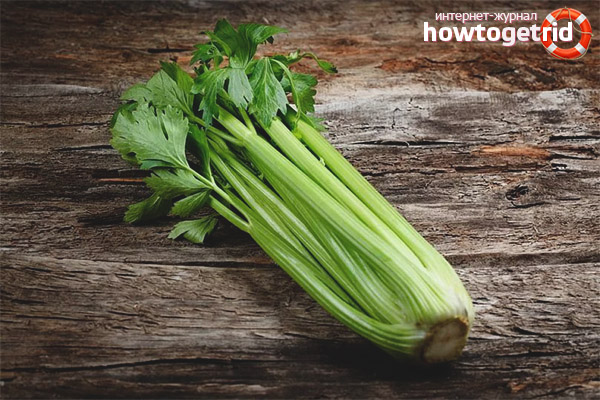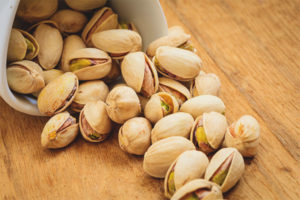The content of the article
Celery is a vegetable crop that is widespread among lovers of a healthy lifestyle and proper nutrition. This plant has earned its popularity due to the rich mineral-vitamin cocktail included in its composition. Nutritionists and phytotherapists, with one voice, argue that if you use fresh celery, the body will receive all the substances necessary for the normal functioning. At the same time, obstetricians and gynecologists, with all due respect to the product, warn future and lactating mothers about the danger and advise to exclude this vegetable from the diet during pregnancy.
What is celery? What is the composition and what health benefits does it bring? Why do doctors not recommend pregnant women to use this vegetable on their menu? How can you apply it without harming yourself and your unborn child? Let's try to understand these issues.
Celery Overview and Composition
People have come to know the beneficial properties of celery for a long time. Even in ancient Greece, it was used for medicinal purposes, as a decoration of dishes, even attributed to it magical abilities, believing that carved leaves bring happiness. In the 19th century, a vegetable brought to America was appreciated in terms of taste and nutritional qualities and is currently a welcome and popular product worldwide.
Celery is of various types, root vegetables, succulent stems and leaves are used for food. Its useful qualities are due to the high content of substances valuable to health. Of the minerals there are magnesium and phosphorus, a lot of iron and zinc, also potassium, sulfur, selenium and other elements. The green mass contains a lot of carotene, vitamins C, E, A, group B. This vegetable is a valuable source of ascorbic, folic and other acids, essential oils and fiber.
Such a rich chemical composition has successfully found its application in folk and traditional medicine. Due to the presence of vitamins and amino acids, the aging process slows down, metabolism improves, digestion normalizes. Essential oils have antiseptic and anti-inflammatory properties, stimulate appetite, have a positive effect on the nervous system. Fiber is known for its cleansing effect, helps lower blood cholesterol, and contributes to weight loss.
Taboo for pregnant
The reason is the high content of essential oils, which, increasing blood flow to the muscles of the uterus, can cause increased contractions. As a result, such changes are fraught with premature termination of pregnancy.
Celery contains some components that can cause an unborn baby’s allergic reaction, and allergies to the components of the product may persist after birth. For the same reason, mothers should not eat this vegetable during breastfeeding, as unwanted allergens can enter the baby's body with milk. In addition, a specific spicy taste can provoke a rejection of the breast.
Another unpleasant consequence of the use of this vegetable crop is increased gas formation, which leads to bloating. This becomes for pregnant women the cause of discomfort, poor health, even painful sensations.
Celery is strictly contraindicated in cases of:
- The presence of signs of a threat of miscarriage or premature birth in the past, as well as the present.
- If you plan to conceive a child during the current menstrual cycle.
- For pain in the lower abdomen and the presence of blood secretions.
- With increased tone of the uterine muscles (according to ultrasound).
- The presence of digestive problems, with diseases such as gastritis and an ulcer, increased secretion of gastric juice with celery, can trigger exacerbations.
- In toxicosis, irritation of the gastric mucosa can increase nausea and vomiting.
How to use
During pregnancy, you can perfectly use the healing qualities of celery, using it for external procedures. Its properties such as quick healing of wounds, pain relief from bruises, and removal of edema can be safely used when making infusions for compresses or ointments. These healing drugs are very easy to make.
To prepare the infusion, you need to grind the root and leaves of celery, mix 1 tbsp. l root vegetables and 2 tbsp. l green mass, pour a glass of boiling water and insist 3-4 hours. Then strain and use as lotions.
Ointment copes with cuts, ulcers, inflammation. To cook it at home, great effort is not needed.
It is necessary to rinse the leaves and stalks of celery well, pass them through a meat grinder, mix with melted butter in a ratio of 1: 1. Store this ointment in the refrigerator.
Some gynecologists allow pregnant women to drink a drink of celery, diluted, for example, with carrot juice or 1: 3 water, of course, in small quantities. But it is up to the observing specialist and the very future mother.
After childbirth and the feeding period, you can safely include your favorite vegetable in your diet. It will help restore not only the internal balance of the body, but will add strength, vitality, transform and refresh the skin, and also, if necessary, contribute to weight loss.
And during pregnancy, you need to remember that taking care of your health at the moment, you care about the healthy future of your baby and nothing, neither your lifestyle, nor nutrition, nor your habits should harm the little man.
Video: the benefits and harms of celery











Submit